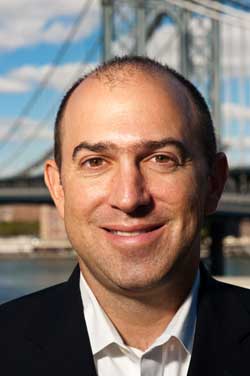Empirically Speaking
As President and COO Of Wireless Generation, Josh Reibel has learned to follow the data
By Joe Levine
“In education, people often fight holy wars that are unnecessary,” says Josh Reibel. “For example, a while back the battle was all about learner-centered versus didactic teaching. Today it’s pretty clear that good instruction blends both.”
Fifteen years ago, Reibel, now President and Chief Operating Officer of Wireless Generation, a Brooklyn-based educational software developer, was pretty firmly identified with the learner-centered side of things. After majoring in philosophy as a Harvard undergraduate, he taught in humanities at Dalton, a private school in Manhattan. He more or less discovered technology as a teaching tool when Dalton, with help from TC faculty member Robbie McClintock, brought in networked computers that linked to cultural institutions around the city, empowering students to pursue rich academic experiences.
Following that project, which was written up in Time, Reibel joined McClintock on 120th Street to earn graduate degrees at TC (he was a recipient of the College’s prestigious Ben D. Wood Fellowship) and to expand TC’s Institute for Learning Technology. He worked on a $24 million effort to bring computers to nearly 100 public schools and led an effort funded by the National Science Foundation to develop a more design-focused curriculum for undergraduate engineering students.
“The field was emphasizing a lot of math problem-solving, and it was losing people with creative sensibilities,” he recalls.
But careers in technology, like the field itself, can evolve in unforeseen ways. After leaving TC, Reibel worked on an online commercial start-up for Kaplan, Inc., the for-profit education company, a foray that sensitized him to the realities of the market. And at Wireless, where data-gathering is always essential, he has become even more of an empiricist. The company is known for its expanding array of digital tools that enable classroom teachers to probe student understanding of different topics and use the findings to tailor instruction. (One of Wireless Generation’s early successes, mCLASS Math, was developed in conjunction with TC faculty member Herbert Ginsburg.) The company’s handheld tools for early grades have been followed by products and services to help educators throughout K-12 improve classroom instruction, whether class by class or at the district level.
All of which makes for a focus on what is, rather than what should be.
“At Wireless Generation we always ask, ‘So what?’ and ‘Now what?’” Reibel says. “Our tools figure out what story the data are telling us and what we should do about it. Teachers are hungry for more and better ways to use data but often don’t have time to delve. They deserve the kind of professional training and analytical tools that are offered in a host of other industries, and that are needed to analyze large patterns in increasingly complex data systems. If a tool can’t identify those patterns for them, that tool won’t result in change.”
Judging by the testimonials from various state and county education systems, Wireless’s products pass that test. For example, in Fayetteville, Arkansas, students assessed with the company’s mCLASS tool over multiple years now enter fourth grade at a higher academic level than did students in previous years. In addition, the number of students reading at benchmark in grades K-5 has increased and the number of struggling readers has decreased. The Oklahoma Department of Education attests that, thanks to its work with Wireless, teaching and learning practices across all of its Reading First Schools have significantly improved. And in Clayton County, Georgia, which has structured its elementary-school literacy program around mCLASS, learning outcomes have improved steadily over the past several years.
Reibel believes these successes prefigure much bigger technology-driven gains in the near future. He predicts that as the field overcomes such issues as the lack of a common language for pooling data from digital tools, researchers will be able to develop more empirically based curricula that lead to mastery of core concepts. He also believes that schools will increasingly be able to identify students at risk for failure or dropping out.
“Over the last decade, national education policy has helped drive us toward more specific understanding of individual learning needs, pinpointing student progress,” he says. “Now we’re moving to the next phase of that innovation, in which we will use data to make systemic improvements and see real change.”
Which sounds pretty learner-centered, after all.
Published Wednesday, May. 2, 2012
